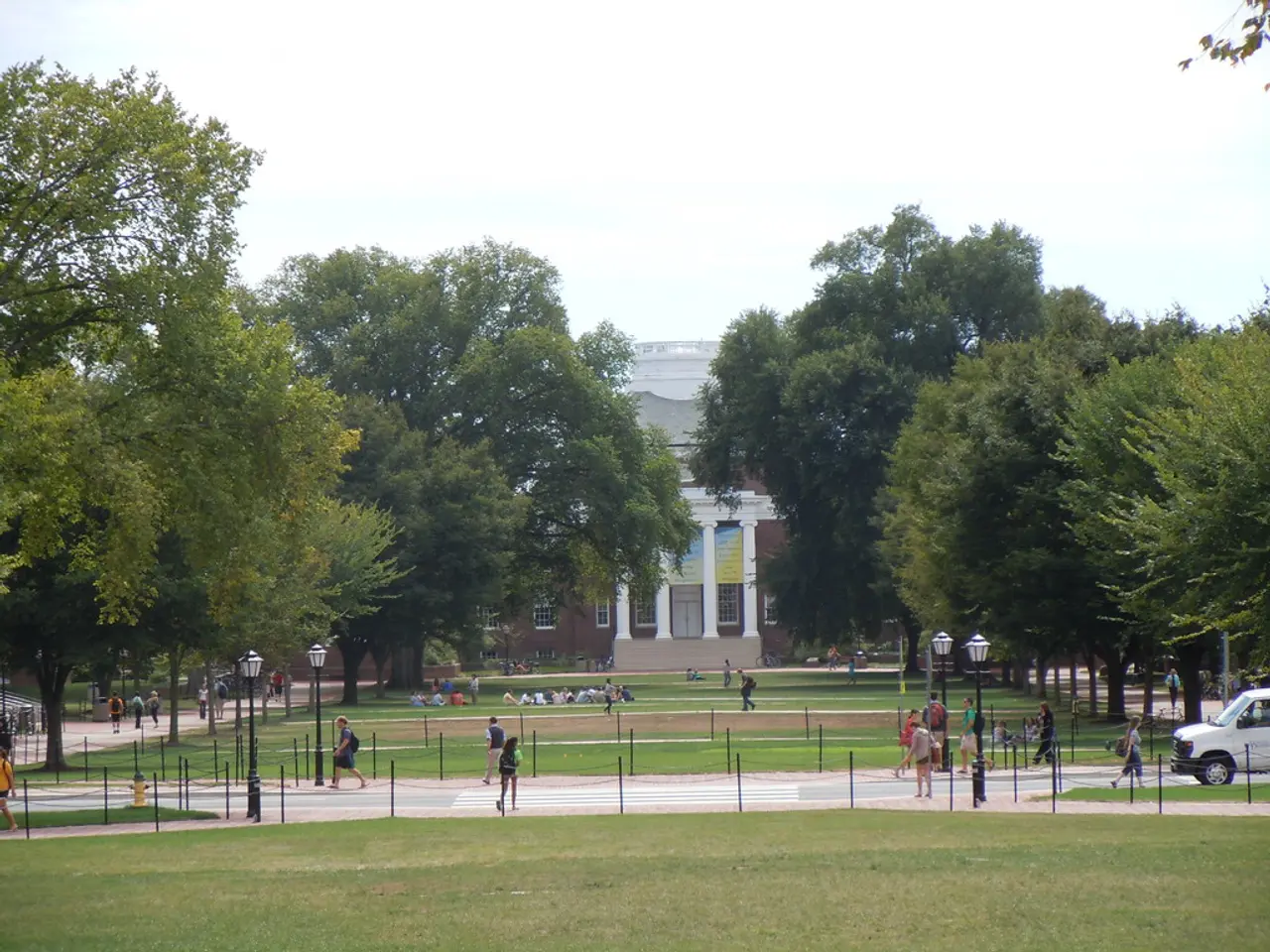University in Denmark observes rise in enrollment from a South Asian nation
In recent years, Denmark has seen a significant increase in the number of international students from Bangladesh, with over 8,000 non-Danish applicants seeking admission to English-taught programs across the country[1]. These students meet established requirements and enroll in 2-year master's programs offered in English, with Roskilde University being a popular destination[1].
Amidst this growing trend, the Danish government is planning to lower the minimum wage threshold for a key work permit scheme, known as the Pay Limit Scheme. This move aims to make it easier for foreign nationals, including recent graduates, to access the labor market[2].
The increased number of Bangladeshi master's graduates and the lower wage threshold could lead to a smoother transition from study to employment. This expansion of the foreign labor pool, particularly skilled young professionals, may intensify competition for jobs in sectors related to their studies, such as IT, engineering, and business[3].
While the influx of qualified international graduates could put pressure on wage dynamics in the market, these graduates are likely to possess skills aligned with Danish labor market needs, contributing positively to the economy[3].
However, security checks on applicants from certain countries have increased, although Bangladesh is not specifically noted among high-risk countries for such measures[4]. This suggests Bangladeshi students may face fewer barriers on security grounds compared to applicants from other nations.
The government's decision to reduce the minimum wage threshold on a work permit scheme could potentially allow a larger number of foreign workers to enter Denmark's labor market. Prime Minister Mette Frederiksen has expressed a preference for foreign workers from countries that are "like-minded" to Denmark[5].
The Immigration Minister, Kaare Dybvad Bek, acknowledged the issue as a "problem," while the Ministry of Immigration and Integration has introduced new rules limiting access to the labor market for people who enter the country on study visas for certain unaccredited programmes[6].
In 2024, 300 students from Bangladesh were admitted to Roskilde University, a significant increase from the nine admitted in 2020[7]. One in six newly admitted master's students at Roskilde University in 2024 came from Bangladesh[8].
Berlingske, a conservative-leaning newspaper, has identified several bureaus that assist Bangladeshi nationals in obtaining Danish study permits through acceptance onto a university program[9]. Despite the concerns raised by right-wing parties, the government, led by Prime Minister Frederiksen, has not indicated a clear intention to limit the number of Bangladeshi students, focusing instead on ensuring the quality of the programs they attend[10].
As Denmark continues to attract more international students, particularly from Bangladesh, the labor market for foreign nationals is poised to see significant changes. The government will need to balance the benefits of a skilled foreign workforce with the need to maintain wage standards and labor market integration policies.
[1] Danish Immigration Service (2022). Statistics on International Students in Denmark. Retrieved from https://nyidanmark.dk/en-us/statistics-and-data/statistics/statistics-on-international-students [2] Danish Ministry of Immigration and Integration (2022). Government Plan to Lower Minimum Wage Threshold on Work Permits. Retrieved from https://www.nyidanmark.dk/en-us/news/government-plan-to-lower-minimum-wage-threshold-on-work-permits [3] Danish Ministry of Immigration and Integration (2022). Impact of Increased Foreign Labor on the Danish Labor Market. Retrieved from https://www.nyidanmark.dk/en-us/news/impact-of-increased-foreign-labor-on-the-danish-labor-market [4] Danish Immigration Service (2022). Increased Security Checks on International Students. Retrieved from https://nyidanmark.dk/en-us/news/increased-security-checks-on-international-students [5] Danish Ministry of Immigration and Integration (2022). Mette Frederiksen on Preference for Like-Minded Foreign Workers. Retrieved from https://www.nyidanmark.dk/en-us/news/mette-frederiksen-on-preference-for-like-minded-foreign-workers [6] Danish Ministry of Immigration and Integration (2022). New Rules Limiting Access to Labor Market for Students in Unaccredited Programmes. Retrieved from https://www.nyidanmark.dk/en-us/news/new-rules-limiting-access-to-labor-market-for-students-in-unaccredited-programmes [7] Roskilde University (2022). Increase in Bangladeshi Students at Roskilde University. Retrieved from https://www.ruc.dk/en/about/news/2022/increase-in-bangladeshi-students-at-roskilde-university [8] Roskilde University (2022). One in Six New Master's Students at Roskilde University in 2024 Come from Bangladesh. Retrieved from https://www.ruc.dk/en/about/news/2022/one-in-six-new-masters-students-at-roskilde-university-in-2024-come-from-bangladesh [9] Berlingske (2022). Bureaus Assisting Bangladeshi Students to Obtain Danish Study Permits. Retrieved from https://www.berlingske.dk/indland/bureauer-der-hjaelper-bangladeshiske-studerende-til-at-opnabe-studie-permitter-i-danmark [10] Danish Ministry of Immigration and Integration (2022). Government Response to Increasing Number of Bangladeshi Students at Roskilde University. Retrieved from https://www.nyidanmark.dk/en-us/news/government-response-to-increasing-number-of-bangladeshi-students-at-roskilde-university
- The rise in Bangladeshi students pursuing master's degrees in Denmark, particularly in the field of IT, engineering, and business, contributes to the general news about the growing number of international students.
- In line with their focus on education-and-self-development, many of these students opt for English-taught programs in policy-and-legislation and online-education, which align with acclaimed Danish universities like Roskilde University.
- As the Danish government is revising policies to allow easier access to employment for foreign nationals through a lower work permit wage threshold, the influx of skilled talent could contribute significantly to the nation's economy and politics.
- With a surge in enrollments each year, learning opportunities for Bangladeshi students in Denmark continue expansion, providing them with a valuable platform for both academic and professional growth.




